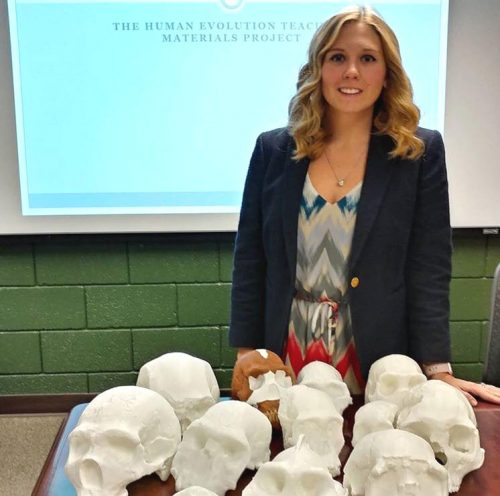
GAINESVILLE, Fla. — Science teachers from across the southeastern U.S. will spend three days this summer 3-D printing hominid skulls as part of a professional development workshop focused on incorporating human evolution into middle and high school science classes.
The Human Evolution Summer Teacher Workshop takes place July 14-18 at the Florida Museum of Natural History.
A total of 21 teachers from Florida, Alabama, Louisiana, Georgia and Mississippi were selected from a pool of more than 75 applicants to work with anthropologists and paleontologists to develop tools that can help overcome some of the barriers to teaching human evolution.
Workshop speakers include:
- Lee Berger, research professor in human evolution and the public understanding of science, University of Witwatersrand (via Skype)
- Kathryn Ranhorn, postdoctoral fellow in department of anthropology, Harvard University (via Skype)
- John Mead, Eugene McDermott master teaching chair in science, St. Marks School of Texas
- Amanda Glaze, assistant professor in middle grades and secondary education, Georgia Southern University
- Rose Bryson, Ph.D. student in anthropology, University of Florida
- Michael Ziegler, master’s student in geology, University of Florida
The workshop is the brainchild of UF biological anthropology Ph.D. student Molly Selba, who developed the Human Evolution Teaching Materials Project several years ago. Through that program, she has had the chance to work one-on-one with educators at more than a dozen schools across the country to beef up their human evolution teaching toolkits.
Selba said many educators she’s worked with want to teach human evolution, but aren’t sure where to start.
“It’s a unique topic because our understanding of human evolution is continually shifting, so resources like textbooks and educational videos become outdated really quickly,” Selba said. “It makes it difficult for teachers to have up-to-date materials and lesson plans.”
By the end of the workshop, teachers will walk away with open-source, modern and accessible lesson plans to take back to their classrooms come fall. Participants will also learn how to use 3-D printing technology to create tangible teaching tools— like hominid skulls to scale.
Selba said another barrier to teaching human evolution is the fact that it is perceived to be a controversial topic.
“We want to give teachers the tools they need to teach human evolution in a way that is both comfortable and informative for the teachers, students and their parents,” Selba said. “We hope that teachers will leave feeling more empowered to incorporate the teaching of human evolution into their existing curricula.”
The workshop is as much for the scientists as it is for the teachers, Selba said.
“We as scientists also hope we gain a better understanding of what resources teachers need so that we can help develop those as part of an ongoing collaboration.”
Other workshop topics include using social media to connect teachers and paleontologists and incorporating 3-D prints in the classroom.
“It is so important for us as researchers to make the work we do available to the public,” Selba said. “K-12 educators play a huge part in informing and inspiring the next generation of men and women in STEM, and as such, they should have the most up-to-date resources and materials at their disposal.”
The workshop is funded by the UF Thompson Earth Systems Institute’s Scientist in Every Florida School program, iDigFossils and the Human Evolution Teaching Materials Project.
“We are thrilled to fund such an innovative project,” said TESI Director Bruce MacFadden. “Connecting scientists with K-12 teachers is part of our mission, and this workshop is a great step in fulfilling that mission.”
TESI can assist with connecting to local participating teachers upon request.
-30-
Source: Molly Selba, mollyselba@ufl.edu, 941-773-9888
Media contact: Rebecca Burton, rlburton@floridamuseum.ufl.edu, 352-273-1939